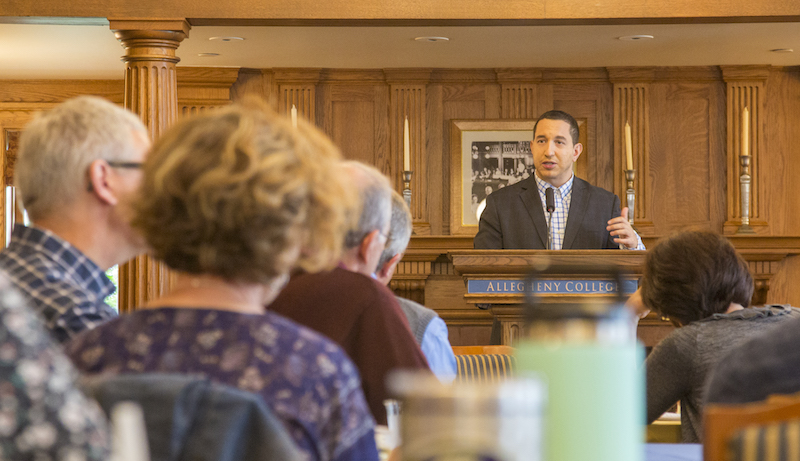
PBS’s Heffner on ‘Civil Discourse in an Uncivil Age’
The “incivility of bigotry” has resulted in a society unable to come together across difference, Alexander Heffner said during a keynote lecture at Allegheny College on Thursday.
“The incivility of bigotry does not mean the incivility of purely racism or xenophobia or nativism. The incivility of bigotry is the incapacity of our society to rationalize and reason with disparate political objectives and constituencies,” Heffner, host of “The Open Mind” on PBS, said to 100 students, faculty, staff and community members gathered in the Tillotson Room of the Tippie Alumni Center.
“When you have a bigoted attitude or mindset it precludes you from having an exchange that is thoughtful and deliberative and fruitful in what it yields.”
Heffner has covered American politics, civic life and Millennials since the 2008 presidential campaign. He founded and edited SCOOP08 and SCOOP44, the first-ever national student newspapers covering the 2008 campaign and the Obama administration.
“The Open Mind” is billed as a “thoughtful excursion into the world of ideas across politics, media, technology, the arts and all realms of civic life,” and is the longest-running public broadcast in the history of American television.
Heffner’s lecture, “Civil Discourse in an Uncivil Age: The Quest for a Post-Partisan Citizenship,” was hosted by the President’s Office, the Center for Political Participation, Journalism in the Public Interest, and the Provost’s Office.
The 2016 presidential primary campaign epitomized “the overall bigotry” that mars our discourse, Heffner said. Increasingly, we see each other not as Americans but as Democrats or Republicans, liberals or conservatives, he said.
That view results in a “refusal to disagreeably agree,” to compromise, Heffner said.
“There is a deliberative process that is supposed to engender disagreement debate and, ultimately, some declaration: the Declaration of Independence, the Declaration of Human Rights, whatever that may be, those declaration of joint values are now quite absent in the overall political picture of our country.”
In the political arena, the inability to compromise leads to dysfunction and a lack of bipartisan support, Heffner said.
“There are no common priorities,” he said. “If there are no common priorities, then the game is tit for tat. The game is a battle of rhetoric. … (American politics) has always been hardball, but it’s not always been a sport that has objectives for partisan, political or individual gain as opposed to collective gain.”
That’s not to say there’s no hope. Heffner’s visit included a breakfast workshop and classes with students, which he noted in this speech.
“There were young people at your college,” he said, “who were quite energized and proudly considering their responsibility in upending the cycle of incivility.”